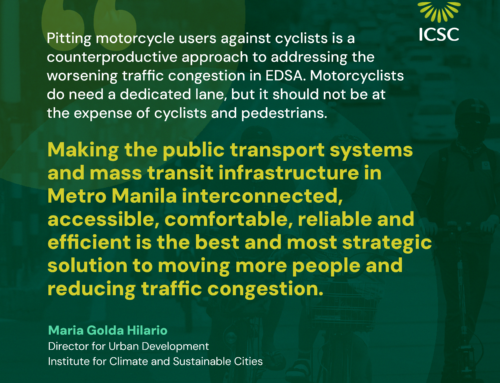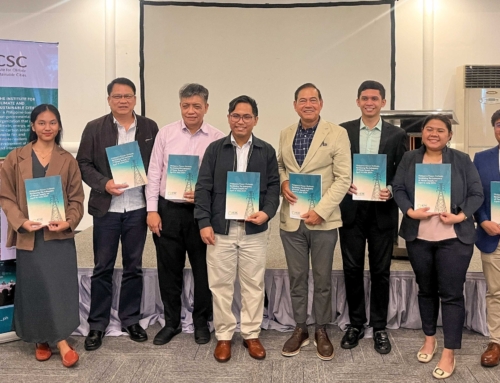by Joseph B.A. Marzan | April 15, 2021| Published by Daily Guardian | READ THE STORY HERE
In a nod to its claim as the country’s bicycling capital, a month-long bike-counting activity conducted by volunteers in Iloilo City a few months ago revealed that more than 20,000 people use their bikes as a mode of transport.
The ‘Friday Bike Count’ conducted on all Fridays in June 2022 indicated that there were 22,114 cyclists on major city thoroughfares, including 12,125 riders in the morning (6:00 a.m. to 8:00 a.m.) and 9,989 in the late afternoon (4:00 p.m. to 6:00 p.m.).
Per date, 6,710 bike commuters were counted on June 3, followed by 4,359 (June 10), 7,660 (June 17), and 3,385 (June 24).
There were more male bikers (95.60 percent) than female bikers (4.30 percent), and the remaining 0.10 percent were undetermined.
The data indicates that the city does away with using 13,008 cars and 18,428 motorcycles daily on the roads, would save more fuel per kilometer against cars (P68,505.27) and motorcycles (P32,847.40), and avoid 2.06 tons (vs. cars) and 1.00 tons (vs. motorcycles) of Carbon Dioxide (CO2), based on data by the Metro Manila Urban Transportation Integration Study (MMUTIS) Update and Enhancement Project conducted by the Japan International Cooperation Agency.
These bike counts were conducted by members of the Iloilo Folding Bike Riders (IFOLD) and supported by the Iloilo City Government’s Transportation Management and Traffic Regulation Office (TMTRO).
This report was released on Wednesday, October 26, and formally presented to the public in a virtual presentation on Thursday, October 27, via Facebook Live.
Professor Early Sol Gadong of Iloilo Bike Ed for Road Safety, who was also one of the volunteers, said that the Iloilo City government’s openness to public comments when it comes to cycling helps improve the state of cycling here.
“Despite Iloilo City being dubbed as one of the friendliest places to cycle in the country, many of us are still loud in bringing up issues here. Thankfully, the [local government unit] is listening to us here. We are not afraid to complain here in Iloilo City,” said Gadong.
Areas included in the count are intersections within Benigno Aquino Avenue, Infante Street, El 98 Street, Molo Plaza, Avanceña Street, Quezon Street, R. Mapa Street, Oñate De Leon Street, Corazon Aquino Avenue (Ungka area), E. Lopez Street (Ledesma Mansion area), Baluarte Fishing Port, Burgos Street, Huervana Street, and Muelle Loney Bridge (Provincial Capitol area).
There were limitations including physical distancing of volunteers during the actual count and lack of manpower and resources.
Although the Public Safety and Transportation Management Office (PSTMO) did initially provide personnel to augment the limited volunteers, they had to pull out due to the implementation of the Local Public Transport Route Plan (LPTRP) on June 12.
The following key recommendations were made out of the bike count results:
- Institutionalization and funding of the bike count as a bi-annual program of the city government;
- Investment and integration of Automated Bike Counters in bike counts and eventual installation for permanent bike counts at intersections along Benigno Aquino Avenue, El 98 Street, Infante Street, Molo Plaza, Avanceña Street, and Quezon Street;
- Expanding bike count windows to 3 hours (5:00 a.m. to 8:00 a.m. and 4:00 p.m. to 7:00 p.m.);
- Volunteer orientations and training, as well as dry run simulations;
- Formation of bike count teams in each station, and equipping them with cameras;
- Increase location coverage, including secondary roads and more entry and exit points in the city; and
- Conducting supplemental studies to understand cycling behaviors and also generate more baseline data.
This bike count is only part of the 2022 Citizen Bike Count, a series of bike counts conducted throughout the country supported under the Mobility Awards, to help cities establish baseline data and monitor the movements of people riding bicycles as they traverse along cities’ road infrastructures.
This was co-organized with the Institute for Climate and Sustainable Cities, The Climate Reality Project Philippines, 350.org, Pinay Bike Commuter Community, and MNL Moves.
Iloilo City was already honored with the Gold Award in the 2021 Mobility Awards as being the most bike-friendly city in the country.
According to the Mobility Awards’ official website, the bike count reports intend to provide a baseline for an annual volunteer count program and to encourage local conversations about the importance of monitoring and baseline data gathering, such as bicycle and pedestrian counts, to inform planning and advocacies for more inclusive and sustainable transportation options for cities and communities.
Bike counts were also conducted in other cities such as Marikina City, Pasig City Quezon City, San Juan City, Baguio City, Naga City, San Juan City, Mandaue City, Cebu City, and Davao City.
Cycling has become an emerging form of personal transportation, with recent Social Weather Stations survey indicated that there are now more bicycle owners than car owners nationwide with 4 bicycles to 1 car, and data by the National Economic Development Authority indicated that 2.1 million bicycles were imported into the country in 2021.
Photo: Thousands of bicycle users somehow affirm Iloilo City’s claim as the country’s Bike Capital. (Arnold Almacen)






